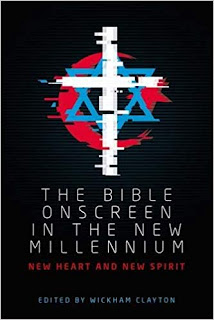mother! (2017)

Hard quite to know what should be classified as a spoiler for this film. I've tried not to give too much away, but it's hard to discuss it without giving something away somewhere.
A phrase that's been repeated again and again as critics seek to make sense of Darren Aronofsky's mother! (2017) is for the need for more time to process things. It's a deeply unsettling film where the intense imagery is unceasing. Those are words that describe the emotional experience of watching it as opposed to a philosophical assessment based on it's use of biblical, and indeed numerous other, archetypes, because it's a film that perhaps above all else is designed to make its audience feel. Almost every shot is taken with in the confines of the tumbledown house that Jennifer Lawrence's titular 'mother' and her partner are seeking to repair. Of it's two hour running time, 66 minutes of it are on on Lawrence's face (Kermode and Mayo, 2017) and almost all of the remaining shots in the film are taken from her point of view. It's a performance that's gained wide praise from critics. Aronofsky himself has said that despite having "watched it hundreds of times, I'm always seeing little things that she's doing that I'm just like wow! I've never seen that before" (Kermode and Mayo, 2017). There's an intensity to the film, which combined with the whirling camera and the claustrophobic atmosphere make for extremely uncomfortable viewing.What's interesting about mother! (small 'm', absolutely significant) is the way that on the one hand it presents the kind of film that feels unique and original (it's failure to conform to any one particular genre is doubtless part of the reason why many have dismissed it), whilst simultaneously being packed full of references and tributes to both other films and other stories. The archetypal references abound with resonances of God, Mother Earth, Adam and Eve, Cain and Abel, Mary, "The Odyssey"'s Penelope and humanity itself rubbing shoulders with a more gnostic and eastern style philosophy.
At the same time it evokes such diverse films as The Amityville Horror, 2001: A Space Odyssey, Rosemary's Baby, zombie movies and the work of Lars von Trier. Many have cited Buñuel's Exterminating Angel, but I see plenty of Viridana in it as well.
Yet at the same time as the cosmic elements of allegory and parable, it's also a story about two individuals, and our differing attitudes to our private spaces. It may be an Englishman's home that is supposed to be his castle, but this attitude clearly crosses gender and continental divides.
OK real spoilers from here on
Having watched this film in close proximity to a further viewing of Noah the portrayal of the Javier Bardem's character, - Him, a God/creator type character - is clearly at the forefront of my mind. Here the character is a selfish narcissist. Him is so wrapped up in garnering praise for himself he is unable to see the damage it is inflicting on what we ultimately discover is his greatest creation. Strangers appear at his door out of nowhere. Are they, too his creations, created to stroke his ego. Is Aronofsky suggesting that God is at least partly culpable for the damage that is being inflicted on our planet? Certainly there's criticism of those that turn up and take from Mother's paradise without considering how their actions are destroying it. End spoilers
Ultimately, such readings are only those that occur to me. What is great about Aronofsky bizarre and ambiguous work is that it will speak differently to different people. The downside is that so many are horrified by it they don't like what they see.
Labels: Other Films













1 Comments:
At 3:27 am, October 07, 2017, Anonymous said…
Anonymous said…
I see "Mother!" as Aronofsky's companion film to "Noah." With "Mother!", Aronofsky seems to be saying that Noah's misanthropic assessment of humanity was correct. However, while Noah was unable to bring himself to bring humanity to an end for the good of the planet, here Mother Nature ultimately destroys herself and her world because humanity is an unredeemable pestilence. She derides Him/God, going so far as to call Him "insane" (or some similar term), when he says that humanity should be forgiven. They are irredeemable and are incapable of being reconciled with God and Mother Nature. It is a profoundly misanthropic message.
Post a Comment
<< Home